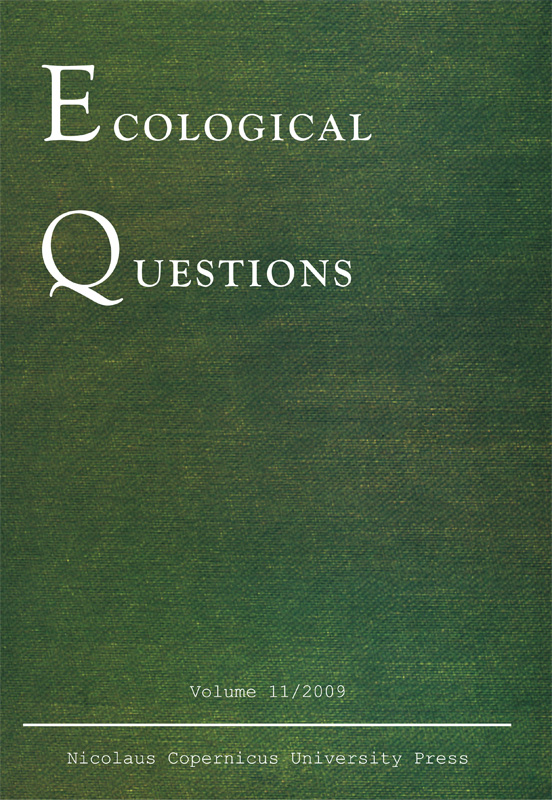Progress in Ecology: Fact or Fiction?
DOI:
https://doi.org/10.12775/v10090-009-0013-0Keywords
criteria for progress, quantitative progress measure, ecological terminology, pluralism in ecology, research hypotheses, principles of scientific methodologyAbstract
The paper focuses on the criteria for the assessment of the progress in ecology and attempts to respond to the question - how to achieve the progress in ecological research? As regards the first issue, the author suggests two criteria, which he finds an easy to determine measure of progress. They include the following: a number of resolved issues and the existing progress in perfecting the ecological terms. With respect to the latter issue, the author specifies six critical recommendations on the basis of literature data and cited opinions of several researchers. According to him, their application would make it possible to achieve an unquestionable progress in ecology.References
Anand M., 1994, Pattern, process and mechanism - the fundamentals of scientific inquiry applied to vegetation science, Coenoses 9 (2): 81-92.
Chapleau F., Johansen P. H. & Williamson M., 1988, The distinction between pattern and process in evolutionary biology: the use and abuse of the term "strategy", Oikos 53 (1): 136-138. DOI: http://dx.doi.org/10.2307/3565673
Eiten G., 1992, How names are used for vegetation?, J. Veg. Sci. 3: 419-424. DOI: http://dx.doi.org/10.2307/3235768
Gotelli N. J. & McCabe D. J., 2002, Species co-occurrence: a meta-analysis of J. M. Diamond's assembly rules model, Ecology 83: 2091-2096.
Golley F. B., 1993, The history of the ecosystem concept in ecology, Yale Univ. Press.
Grace J. B. & Tilman D. (eds.), 1990, Perspectives on plant competition, Academic Press, San Diego.
Heller M., 1992, Filozofia nauki. Wprowadzenie [Philosophy of science. Introduction], Wyd. Naukowe Papieskiej Akademii Teologicznej, Kraków.
Keddy P. A., 1987, Beyond reductionism and scholasticism in plant community ecology, Vegetatio 69: 209-211.
Keddy P. A., 1989, Competition, Chapman & Hall, London - New York.
Lawton J. H., 1991, Ecology as she is done, and could be done, Oikos 61: 289-290.
Mason H. L. & Langenheim J. H., 1957, Language analysis and the concept environment, Ecology 38 (2): 325-340. DOI: http://dx.doi.org/10.2307/1931693
Matejka K., 1992, Confusing of terms in ecology - an example of the ecotone polemic, Ekológia (ČSFR) 11(1): 99-102.
McIntosh R. P., 1967, The continuum concept of vegetation, Bot. Rev. 33: 130-187.
McIntosh R. P., 1975, Gleason - "individualistic ecologist", 1882-1975: his contributions to ecological theory, Bull. Torrey Bot. Club 102 (5): 253-273.
McIntosh R. P., 1985, The background of ecology: Concept and Theory, Cambridge University Press, Cambridge, England.
McIntosh R. P., 1993, The continuum continued: John T. Curtis' influence on ecology, [in:] J. S. Fralish, R. P. McIntosh & O. L. Loucks (eds), John T. Curtis: fifty years of Wisconsin plant ecology, Wisconsin Academy of Science, Arts and Letters, Madison: 95-122.
Milne A., 1961, Definition of competition among animals, Symposia of the Society for Experimental Biology 15: 40-61.
Murray B. G., 1992, Research methods in physics and biology, Oikos 64: 594-596.
Peet R. K., 1974, The measurement of species diversity, Annual Rev. Ecol. Syst. 5: 285-307. DOI: http://dx.doi.org/10.1146/annurev.es.05.110174.001441
Peters R. H., 1980, Useful concepts for predictive ecology, Synthese 43: 257-269.
Peters R. H., 1991, A critique for ecology, University Press, Cambridge.
Price P. W., 1984, Alternative paradigms in community ecology, [in:] P. W. Price, C. N. Slobodchikoff & W. S. Gould (eds), A new ecology: novel approaches to interactive systems, J. Wiley & Sons, New York - Chichester - Brisbane: 354-381.
Quenette P. Y. & Gerard J. F., 1993, Why biologists do not think like Newtonian physicists, Oikos 68 (2): 361-363. DOI: http://dx.doi.org/10.2307/3544852
Rejmánek M., 1977, The concept of structure in phytosociology with references to classification of plant communities, Vegetatio 35: 55-61.
Scheiner S. M., Hudson A. J. & Van der Meulen M. A., 1993, An epistemology for ecology, Bull. Ecol. Soc. Am. 74 (1): 17-21.
Shipley B. & Keddy P. A., 1987, The individualistic and community-unit concepts as falsifiable hypotheses, Vegetatio 69: 47-55. DOI: http://dx.doi.org/10.1007/BF00038686
Stearns S. C., 1976, Life history tactics: a review of the ideas, Quart. Rev. Biol. 51: 3-47. DOI: http://dx.doi.org/10.1086/409052
Stewart I., 1996, Czy Bóg gra w kości? Nowa matematyka chaosu [Does God play dice? New mathematics of chaos], Wydawnictwo Naukowe PWN, Warszawa.
Strong D. R., Jr., Simberloff D., Abele L. G. & Thistle A. B. (eds), 1984, Ecological communities: conceptual issues and the evidence, Princeton University Press, Princeton.
Ulrich, W., 2004, Species co-occurrences and neutral models: reassessing J. M. Diamond's assembly rules, Oikos 107: 603-609.
Ulrich W., & Gotelli N. J., 2007, Disentangling community patterns of nestedness and species co-occurrence, Oikos 116: 2053-2061. http://gateway.webofknowledge.com/gateway/Gateway.cgi?GWVersion=2&SrcApp=PARTNER_APP&SrcAuth=LinksAMR&KeyUT=000251205500013&DestLinkType=FullRecord&DestApp=ALL_WOS&UsrCustomerID=b7bc2757938ac7a7a821505f8243d9f3
Weiner J., 1995, On the practice of ecology, J. Ecol. 83: 153-158. DOI: http://dx.doi.org/10.2307/2261159
Werle J., 1992, Jedność przyrody - rzeczywistość czy iluzja? [Unity of the nature - reality or illusion?], [in:] Problemy Naukowe Współczesności [Scientific Problems of the Present Time], Ossolineum, Warszawa.
Wiegleb G., 1989, Explanation and prediction in vegetation science, Vegetatio 83 (1/2): 17-34. DOI: http://dx.doi.org/10.1007/BF00031678
Downloads
Published
How to Cite
Issue
Section
Stats
Number of views and downloads: 617
Number of citations: 0



